
AI-Agents-for-Medical-Diagnostics
A Python project to create specialized LLM-based AI agents that analyze complex medical cases. The system integrates insights from various medical professionals to provide comprehensive assessments and personalized treatment recommendations, showcasing the potential of AI in multidisciplinary medicine.
Stars: 88
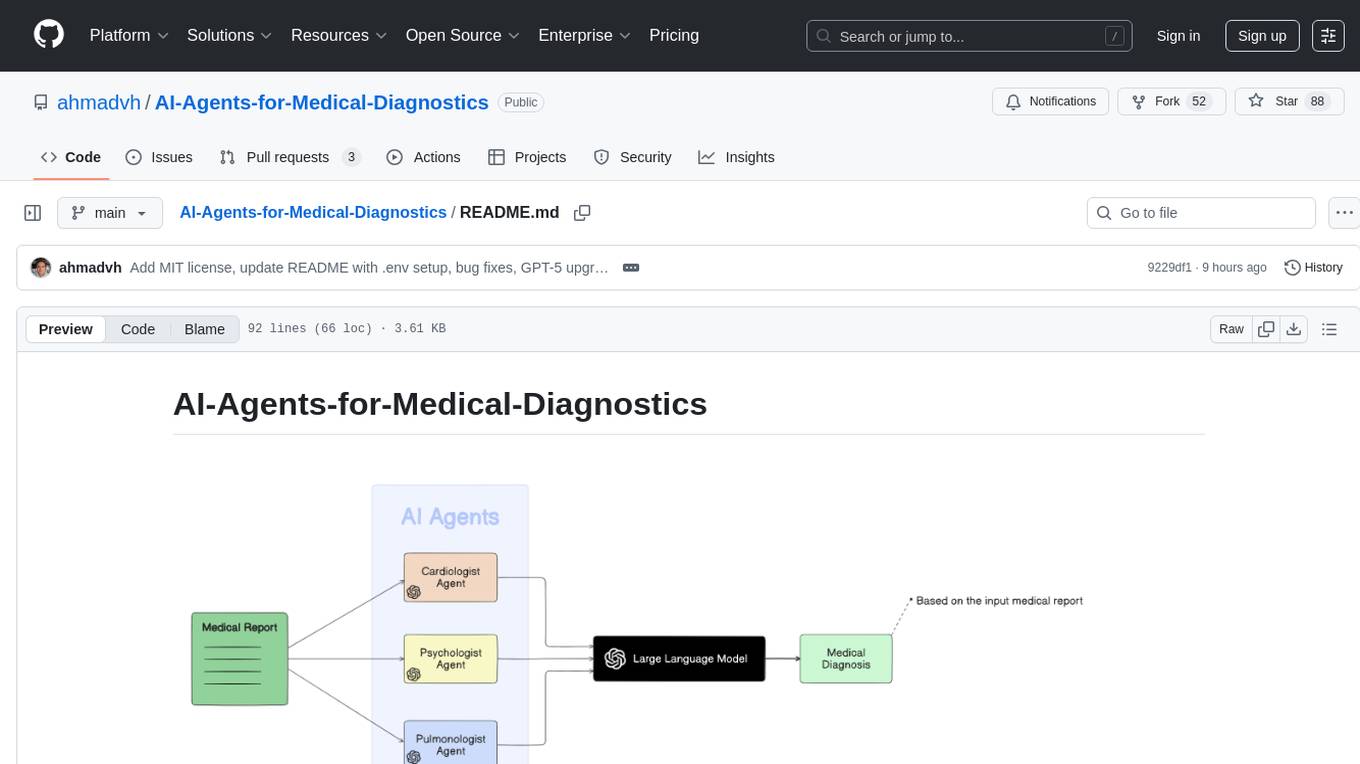
AI Agents for Medical Diagnostics is a repository containing a collection of machine learning models and algorithms designed to assist in medical diagnosis. The tools provided in this repository are specifically tailored for analyzing medical data and making predictions related to various health conditions. By leveraging the power of artificial intelligence, these agents aim to improve the accuracy and efficiency of diagnostic processes in the medical field. Researchers, healthcare professionals, and data scientists can benefit from the resources available in this repository to develop innovative solutions for diagnosing illnesses and predicting patient outcomes.
README:
A Python project that creates specialized LLM-based AI agents to analyze complex medical cases.
The system integrates insights from different medical specialists to provide comprehensive assessments
and suggested treatment directions, demonstrating the potential of AI in multidisciplinary medicine.
It is not intended for clinical use.
- Added MIT License
- Fixed bugs and updated
requirements.txt - Added
.gitignore - Upgraded core LLM to GPT-5
In the current version, we use three AI agents (GPT-5), each specializing in a different aspect of medical analysis.
A medical report is passed to all agents, which run in parallel (threading) and return their findings.
The outputs are then combined and summarized into three possible health issues with reasoning.
1. Cardiologist Agent
- Focus: Detect cardiac issues such as arrhythmias or structural abnormalities.
- Recommendations: Cardiovascular testing, monitoring, and management strategies.
2. Psychologist Agent
- Focus: Identify psychological conditions (e.g., panic disorder, anxiety).
- Recommendations: Therapy, stress management, or medication adjustments.
3. Pulmonologist Agent
- Focus: Assess respiratory causes for symptoms (e.g., asthma, breathing disorders).
- Recommendations: Lung function tests, breathing exercises, respiratory treatments.
-
Medical Reports/→ Synthetic medical report samples -
Results/→ Outputs generated by the agents
-
Clone the repo:
git clone https://github.com/ahmadvh/AI-Agents-for-Medical-Diagnostics.git cd AI-Agents-for-Medical-Diagnostics -
Create a virtual environment and install dependencies:
python -m venv venv source venv/bin/activate # On Windows: venv\Scripts\activate pip install -r requirements.txt
-
Set up your API credentials:
- Create a file named apikey.env in the project root.
- Add your OpenAI (or other LLM provider) credentials:
OPENAI_API_KEY=your_api_key_here
-
Run the system:
python main.py
Planned improvements for upcoming versions include:
- Specialist Expansion: Add new agents for Neurology, Endocrinology, Immunology, and other fields.
- Local LLM Support: Integrate models such as Llama 4 via Ollama, vLLM, or llama.cpp, with function-calling style hooks and safe code execution.
- Vision Capabilities: Enable multimodal decision-making with agents that analyze radiology images and other medical scans.
- Live Data Tools: Incorporate LLM-based tools for real-time search and querying structured medical datasets.
- Advanced Parsing: Improve handling of complex medical reports with structured outputs (e.g., JSON schema validation).
- Automated Testing: Add evaluation pipelines and smoke-test CI with mocked LLM calls for reproducibility.
This repository is licensed under the MIT License.
You are free to use, copy, modify, merge, publish, distribute, sublicense, and/or sell copies of the software, subject to the conditions described in the LICENSE file.
The software is provided “as is”, without warranty of any kind.
For Tasks:
Click tags to check more tools for each tasksFor Jobs:
Alternative AI tools for AI-Agents-for-Medical-Diagnostics
Similar Open Source Tools

AI-Agents-for-Medical-Diagnostics
AI Agents for Medical Diagnostics is a repository containing a collection of machine learning models and algorithms designed to assist in medical diagnosis. The tools provided in this repository are specifically tailored for analyzing medical data and making predictions related to various health conditions. By leveraging the power of artificial intelligence, these agents aim to improve the accuracy and efficiency of diagnostic processes in the medical field. Researchers, healthcare professionals, and data scientists can benefit from the resources available in this repository to develop innovative solutions for diagnosing illnesses and predicting patient outcomes.

nmed2024
Nmed2024 is a GitHub repository that contains code for a neural network model designed for medical image analysis. The repository includes scripts for training the model, as well as pre-trained weights for quick deployment. The model is specifically tailored for detecting abnormalities in medical images, such as tumors or fractures. It utilizes deep learning techniques to achieve high accuracy and can be easily integrated into existing medical imaging systems. Researchers and developers in the healthcare industry can leverage this tool to enhance the efficiency and accuracy of medical image analysis tasks.
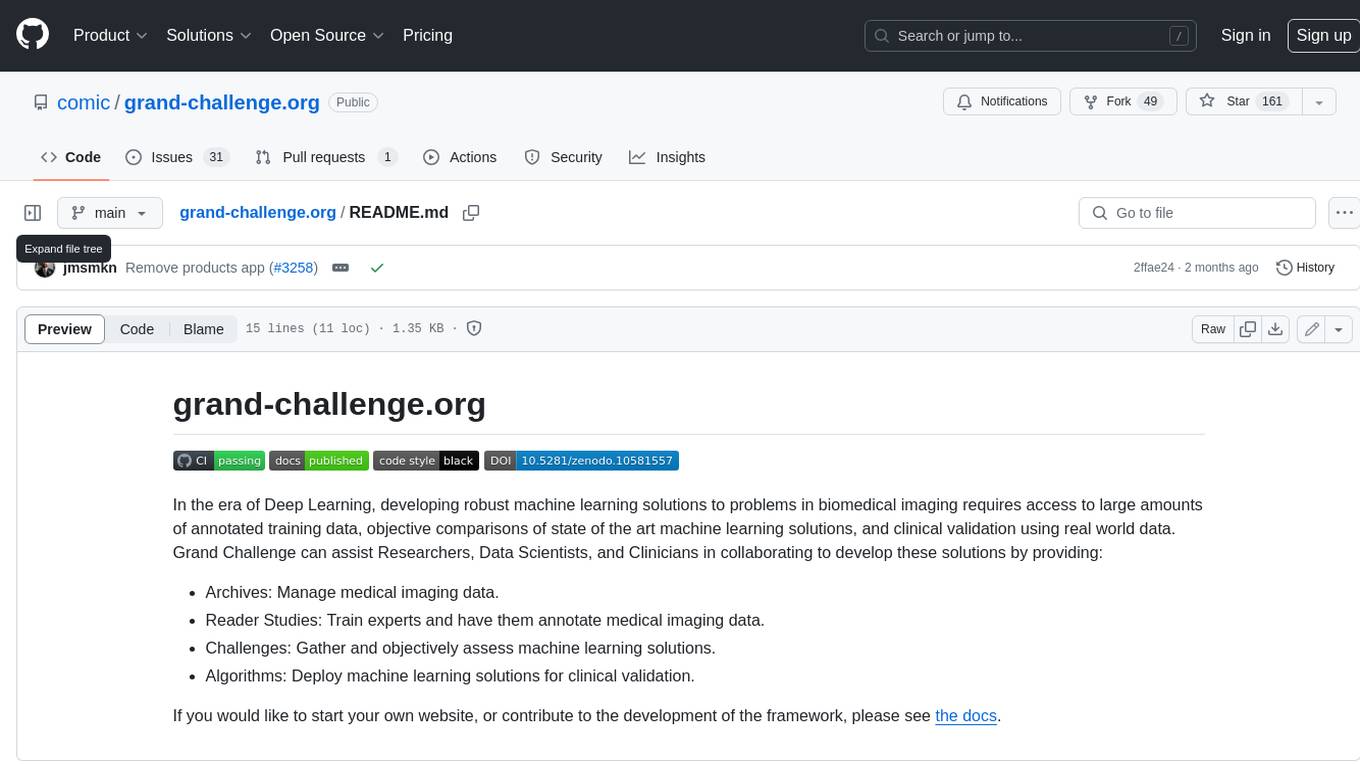
grand-challenge.org
Grand Challenge is a platform that provides access to large amounts of annotated training data, objective comparisons of state-of-the-art machine learning solutions, and clinical validation using real-world data. It assists researchers, data scientists, and clinicians in collaborating to develop robust machine learning solutions to problems in biomedical imaging.
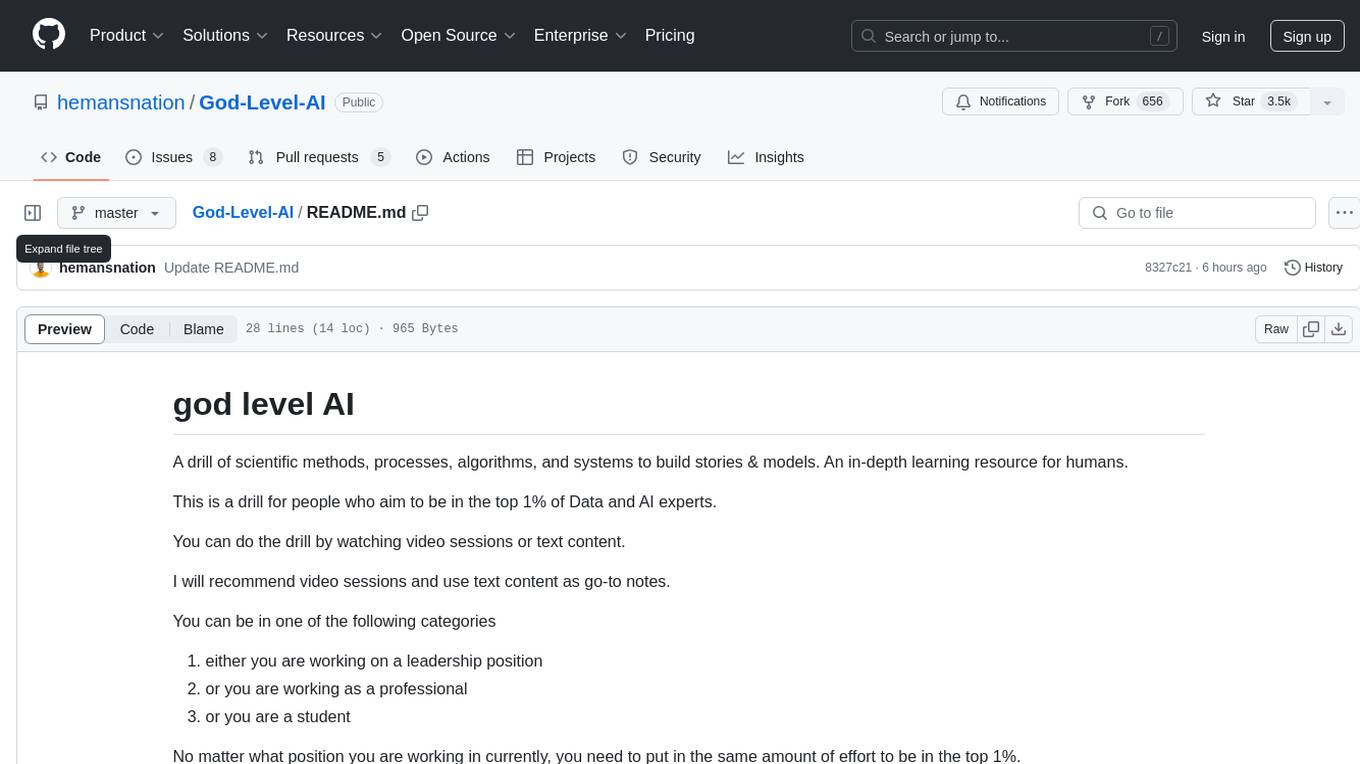
God-Level-AI
A drill of scientific methods, processes, algorithms, and systems to build stories & models. An in-depth learning resource for humans. This repository is designed for individuals aiming to excel in the field of Data and AI, providing video sessions and text content for learning. It caters to those in leadership positions, professionals, and students, emphasizing the need for dedicated effort to achieve excellence in the tech field. The content covers various topics with a focus on practical application.
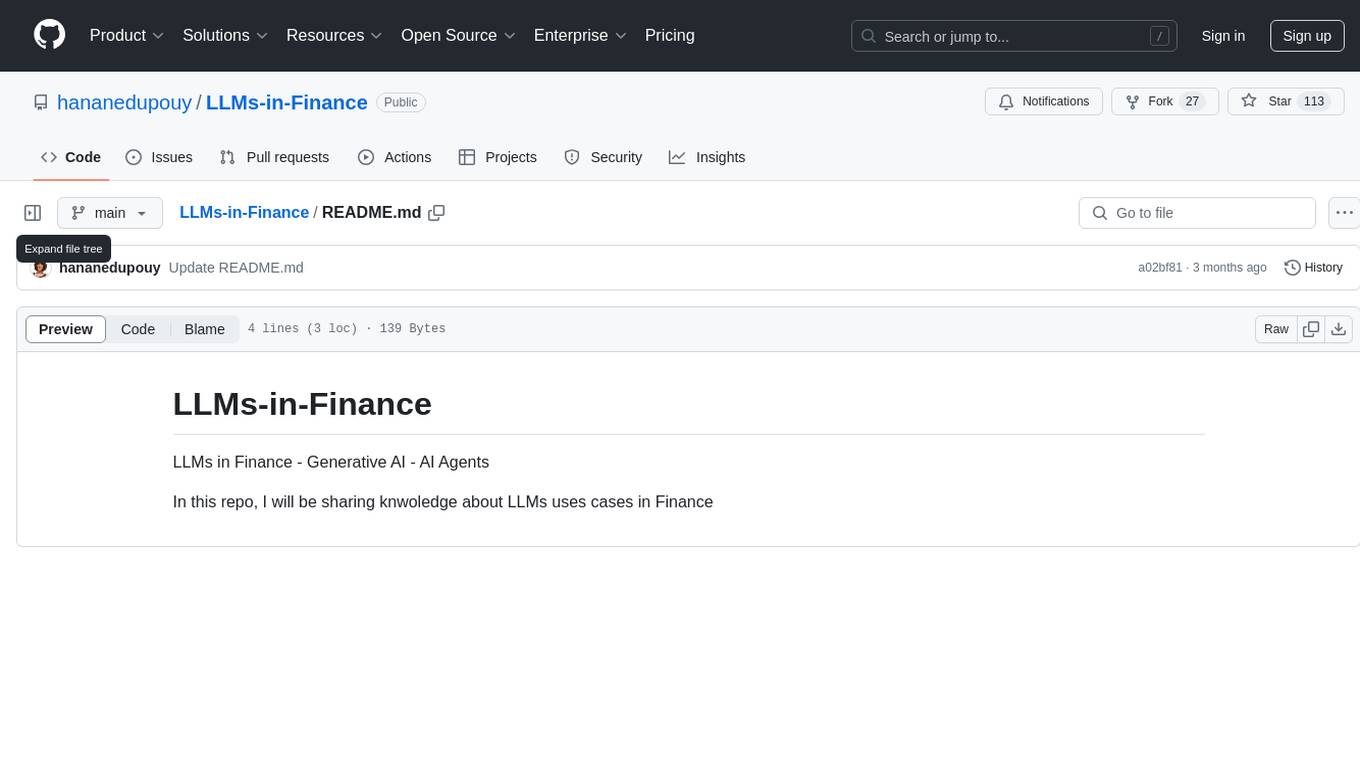
LLMs-in-Finance
This repository focuses on the application of Large Language Models (LLMs) in the field of finance. It provides insights and knowledge about how LLMs can be utilized in various scenarios within the finance industry, particularly in generating AI agents. The repository aims to explore the potential of LLMs to enhance financial processes and decision-making through the use of advanced natural language processing techniques.
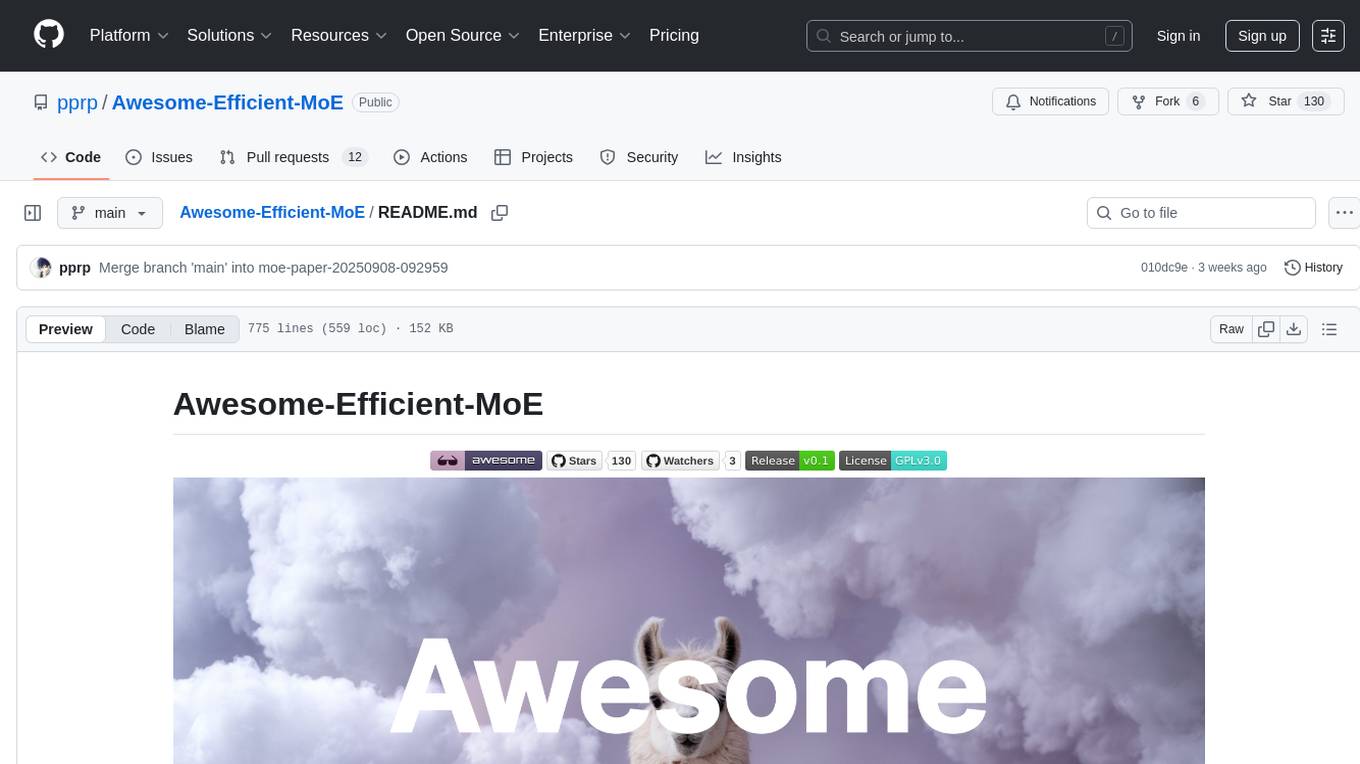
Awesome-Efficient-MoE
Awesome Efficient MoE is a GitHub repository that provides an implementation of Mixture of Experts (MoE) models for efficient deep learning. The repository includes code for training and using MoE models, which are neural network architectures that combine multiple expert networks to improve performance on complex tasks. MoE models are particularly useful for handling diverse data distributions and capturing complex patterns in data. The implementation in this repository is designed to be efficient and scalable, making it suitable for training large-scale MoE models on modern hardware. The code is well-documented and easy to use, making it accessible for researchers and practitioners interested in leveraging MoE models for their deep learning projects.
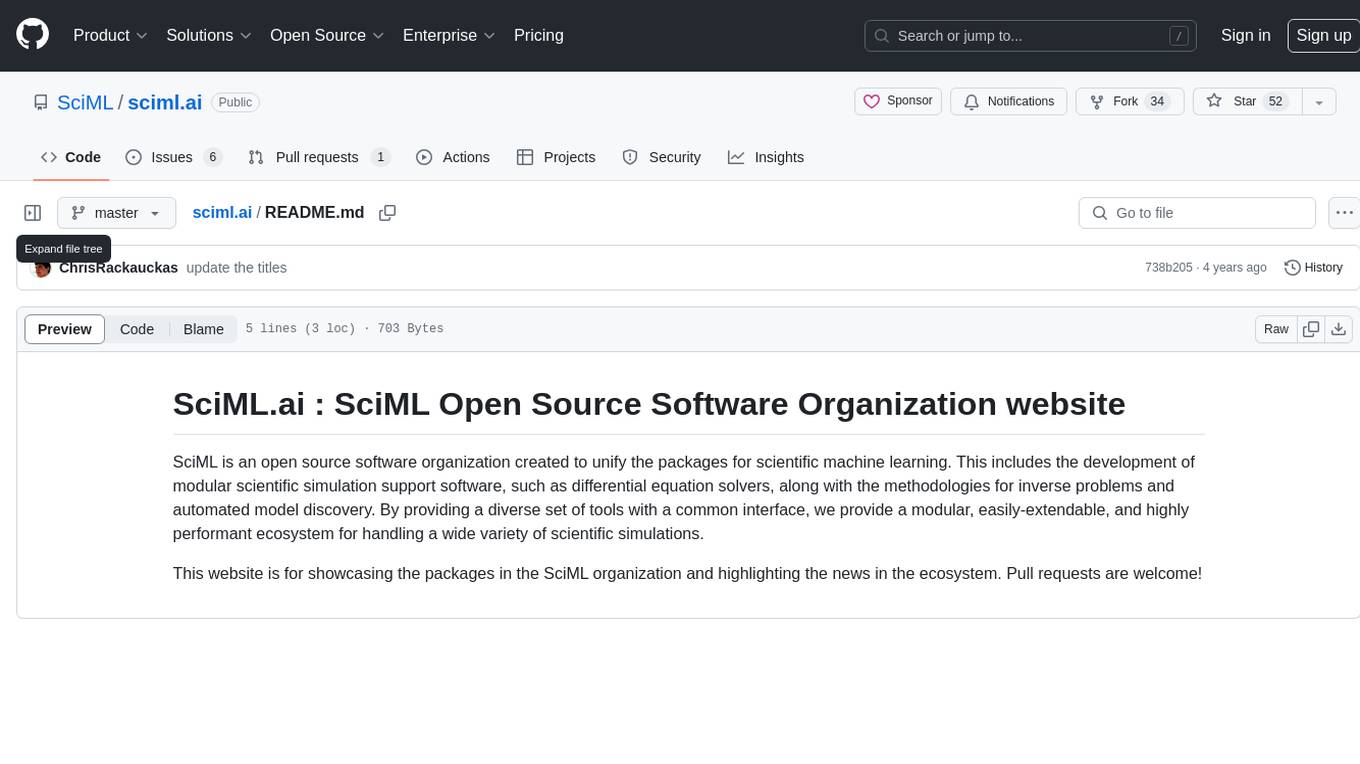
sciml.ai
SciML.ai is an open source software organization dedicated to unifying packages for scientific machine learning. It focuses on developing modular scientific simulation support software, including differential equation solvers, inverse problems methodologies, and automated model discovery. The organization aims to provide a diverse set of tools with a common interface, creating a modular, easily-extendable, and highly performant ecosystem for scientific simulations. The website serves as a platform to showcase SciML organization's packages and share news within the ecosystem. Pull requests are encouraged for contributions.
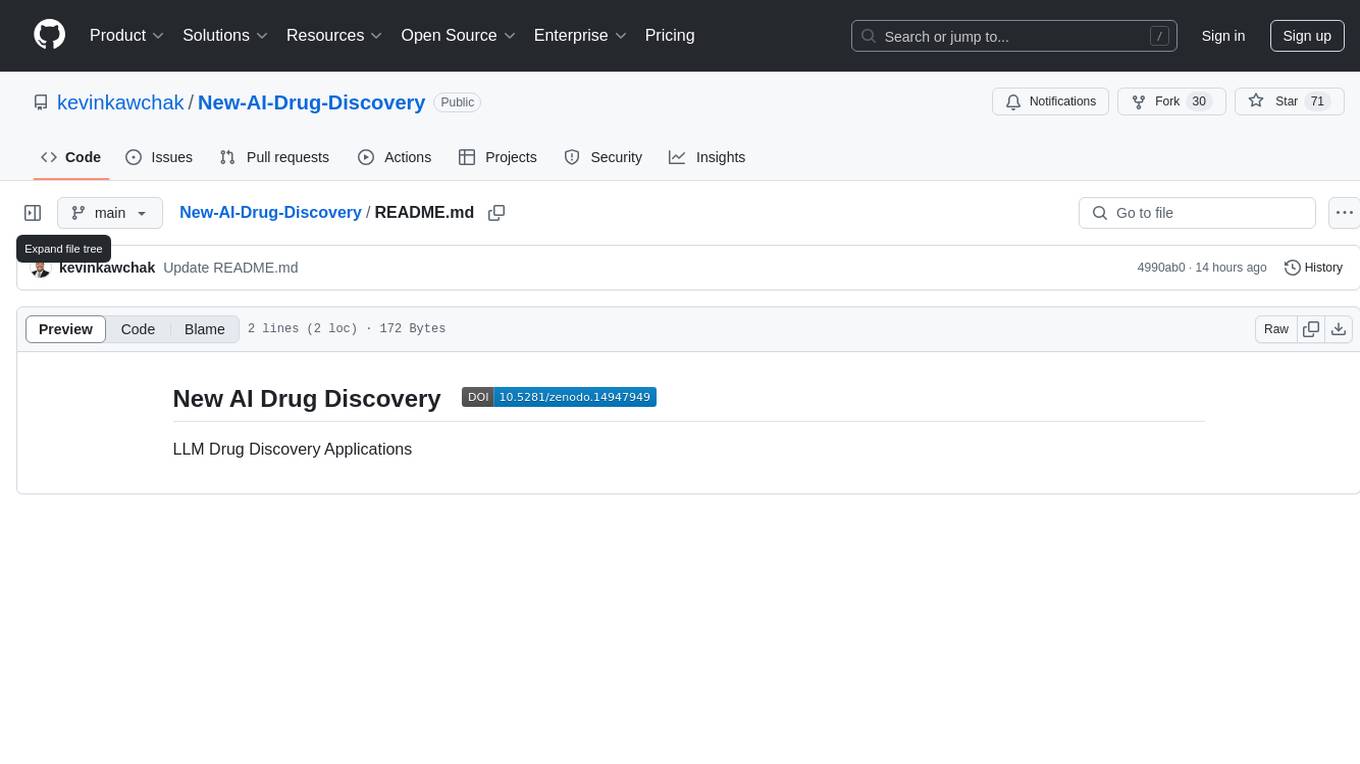
New-AI-Drug-Discovery
New AI Drug Discovery is a repository focused on the applications of Large Language Models (LLM) in drug discovery. It provides resources, tools, and examples for leveraging LLM technology in the pharmaceutical industry. The repository aims to showcase the potential of using AI-driven approaches to accelerate the drug discovery process, improve target identification, and optimize molecular design. By exploring the intersection of artificial intelligence and drug development, this repository offers insights into the latest advancements in computational biology and cheminformatics.
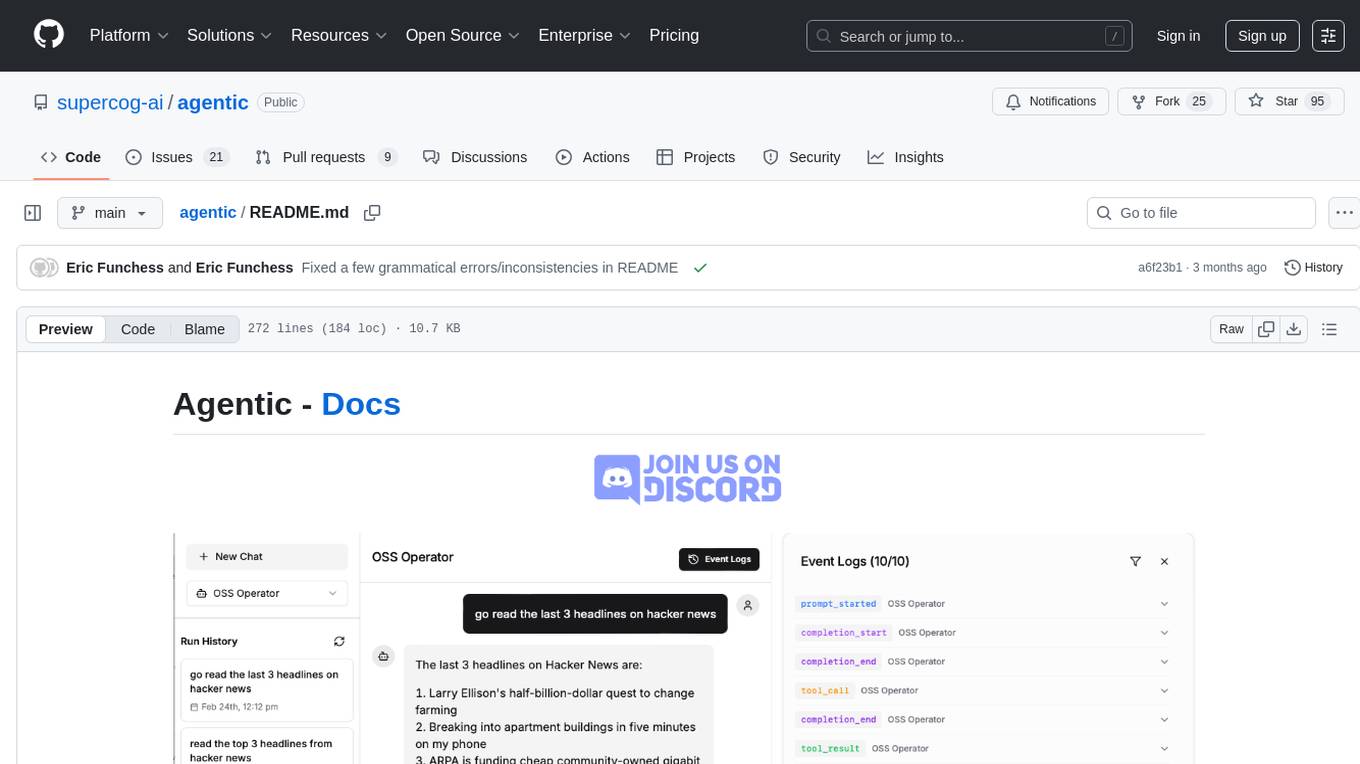
agentic
Agentic is a lightweight and flexible Python library for building multi-agent systems. It provides a simple and intuitive API for creating and managing agents, defining their behaviors, and simulating interactions in a multi-agent environment. With Agentic, users can easily design and implement complex agent-based models to study emergent behaviors, social dynamics, and decentralized decision-making processes. The library supports various agent architectures, communication protocols, and simulation scenarios, making it suitable for a wide range of research and educational applications in the fields of artificial intelligence, machine learning, social sciences, and robotics.

lemonai
LemonAI is a versatile machine learning library designed to simplify the process of building and deploying AI models. It provides a wide range of tools and algorithms for data preprocessing, model training, and evaluation. With LemonAI, users can easily experiment with different machine learning techniques and optimize their models for various tasks. The library is well-documented and beginner-friendly, making it suitable for both novice and experienced data scientists. LemonAI aims to streamline the development of AI applications and empower users to create innovative solutions using state-of-the-art machine learning methods.
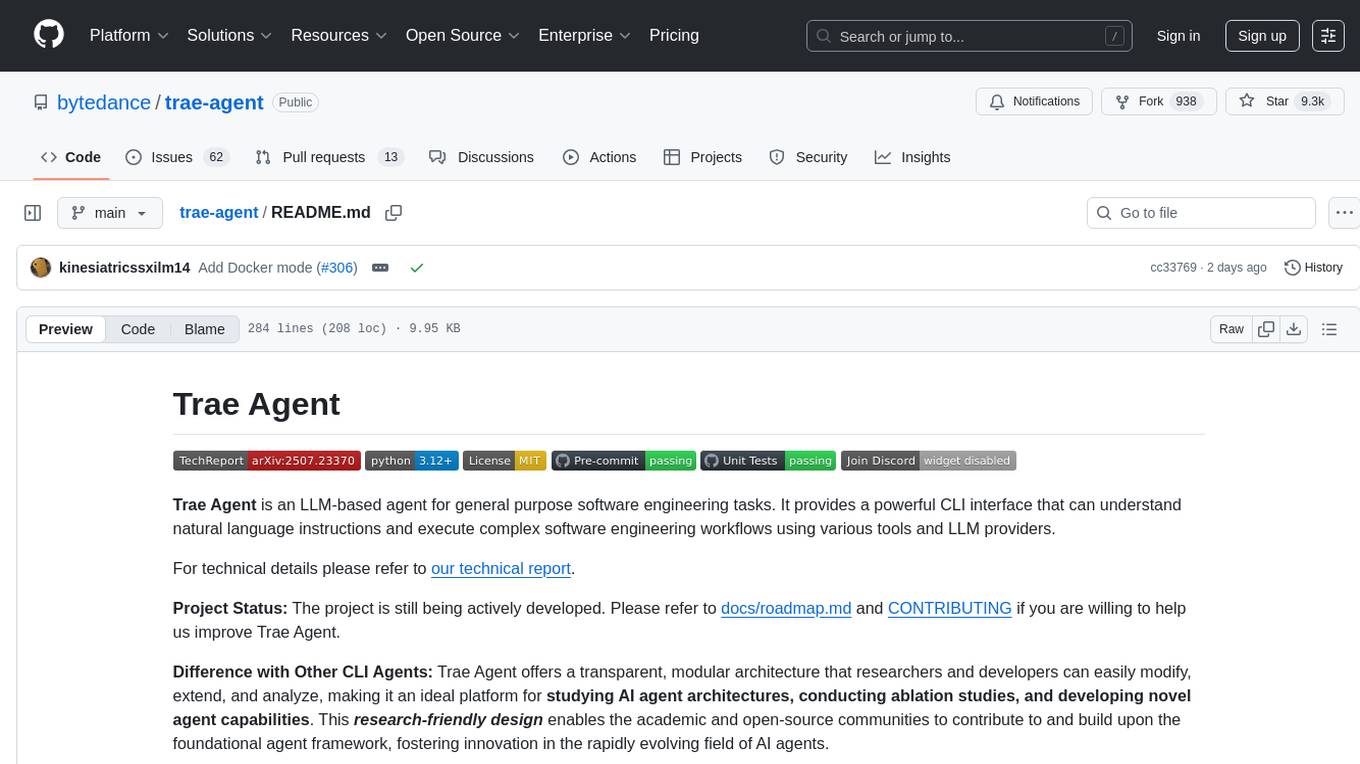
trae-agent
Trae-agent is a Python library for building and training reinforcement learning agents. It provides a simple and flexible framework for implementing various reinforcement learning algorithms and experimenting with different environments. With Trae-agent, users can easily create custom agents, define reward functions, and train them on a variety of tasks. The library also includes utilities for visualizing agent performance and analyzing training results, making it a valuable tool for both beginners and experienced researchers in the field of reinforcement learning.
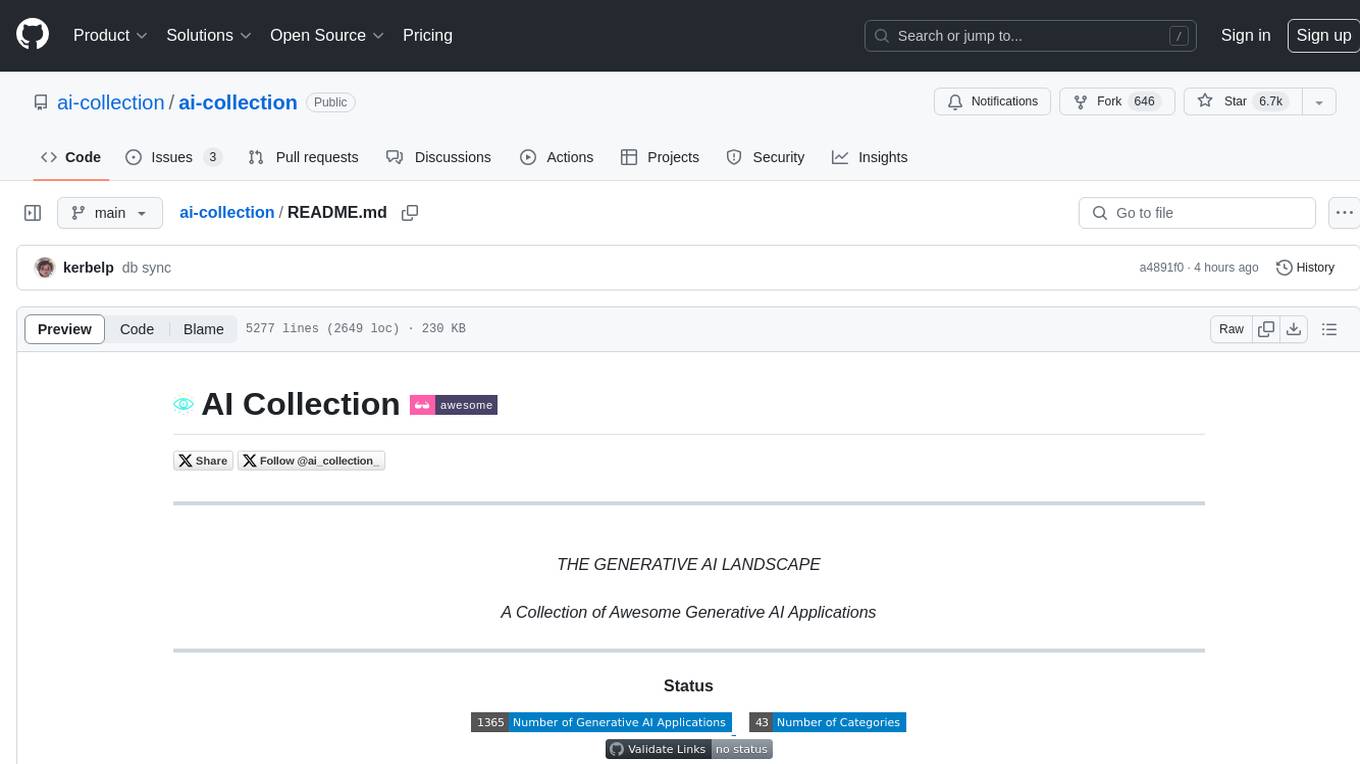
ai-collection
The ai-collection repository is a collection of various artificial intelligence projects and tools aimed at helping developers and researchers in the field of AI. It includes implementations of popular AI algorithms, datasets for training machine learning models, and resources for learning AI concepts. The repository serves as a valuable resource for anyone interested in exploring the applications of artificial intelligence in different domains.
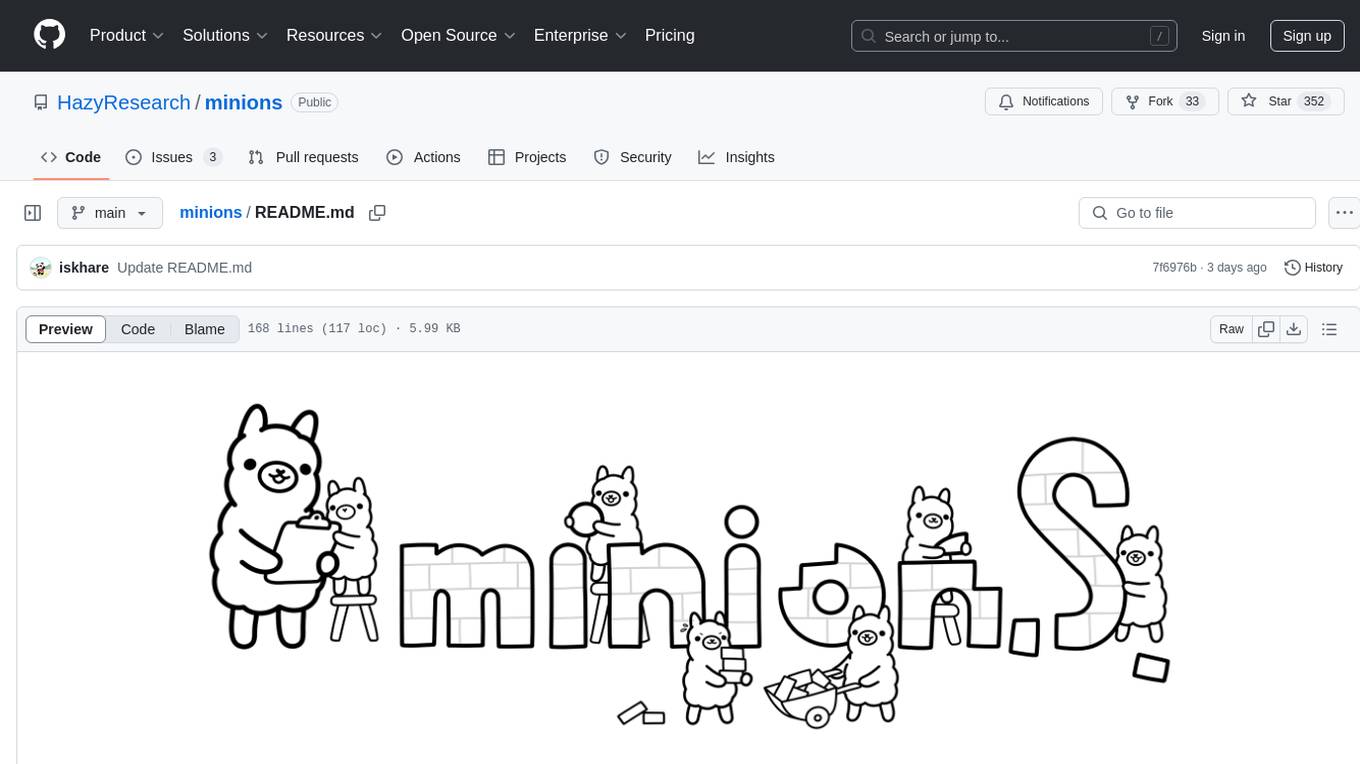
minions
Minions is a communication protocol that enables small on-device models to collaborate with frontier models in the cloud. By only reading long contexts locally, it reduces cloud costs with minimal or no quality degradation. The repository provides a demonstration of the protocol.
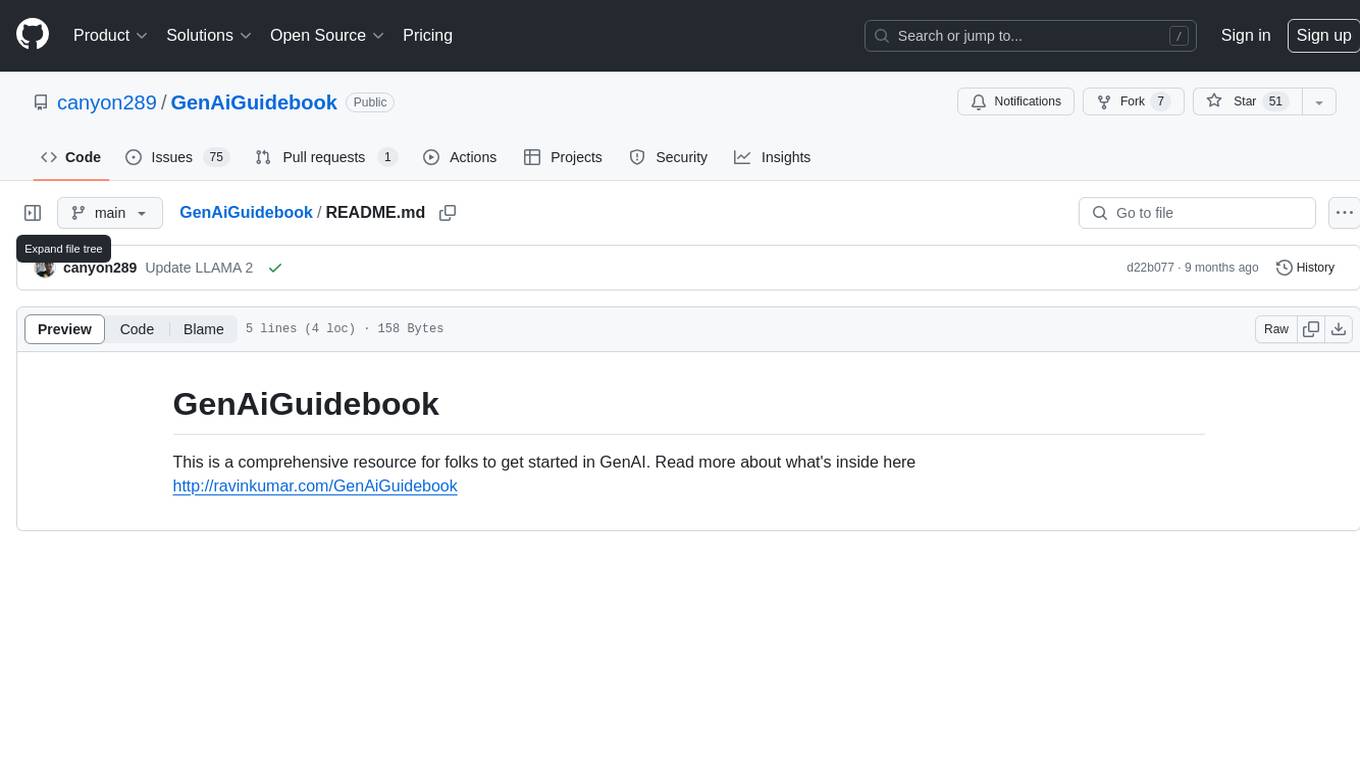
GenAiGuidebook
GenAiGuidebook is a comprehensive resource for individuals looking to begin their journey in GenAI. It serves as a detailed guide providing insights, tips, and information on various aspects of GenAI technology. The guidebook covers a wide range of topics, including introductory concepts, practical applications, and best practices in the field of GenAI. Whether you are a beginner or an experienced professional, this resource aims to enhance your understanding and proficiency in GenAI.
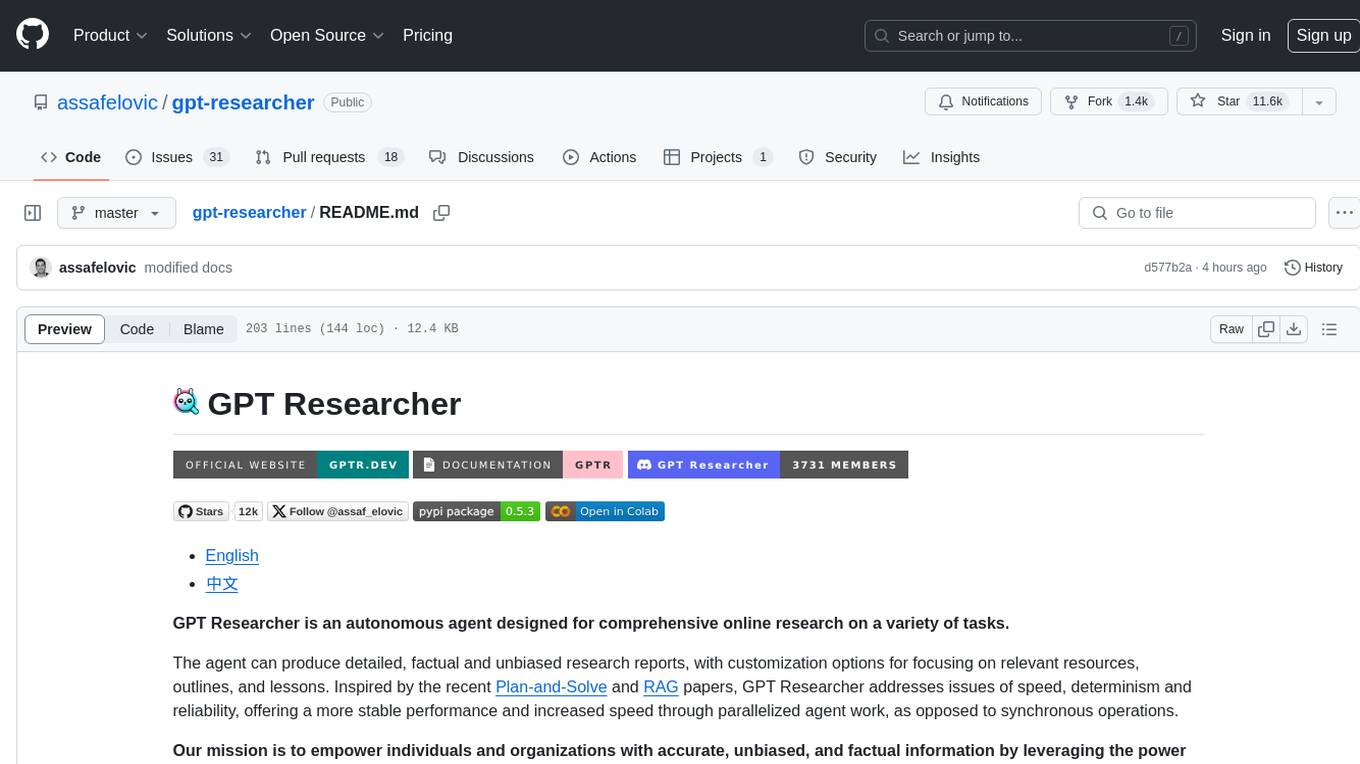
gpt-researcher
GPT Researcher is an autonomous agent designed for comprehensive online research on a variety of tasks. It can produce detailed, factual, and unbiased research reports with customization options. The tool addresses issues of speed, determinism, and reliability by leveraging parallelized agent work. The main idea involves running 'planner' and 'execution' agents to generate research questions, seek related information, and create research reports. GPT Researcher optimizes costs and completes tasks in around 3 minutes. Features include generating long research reports, aggregating web sources, an easy-to-use web interface, scraping web sources, and exporting reports to various formats.
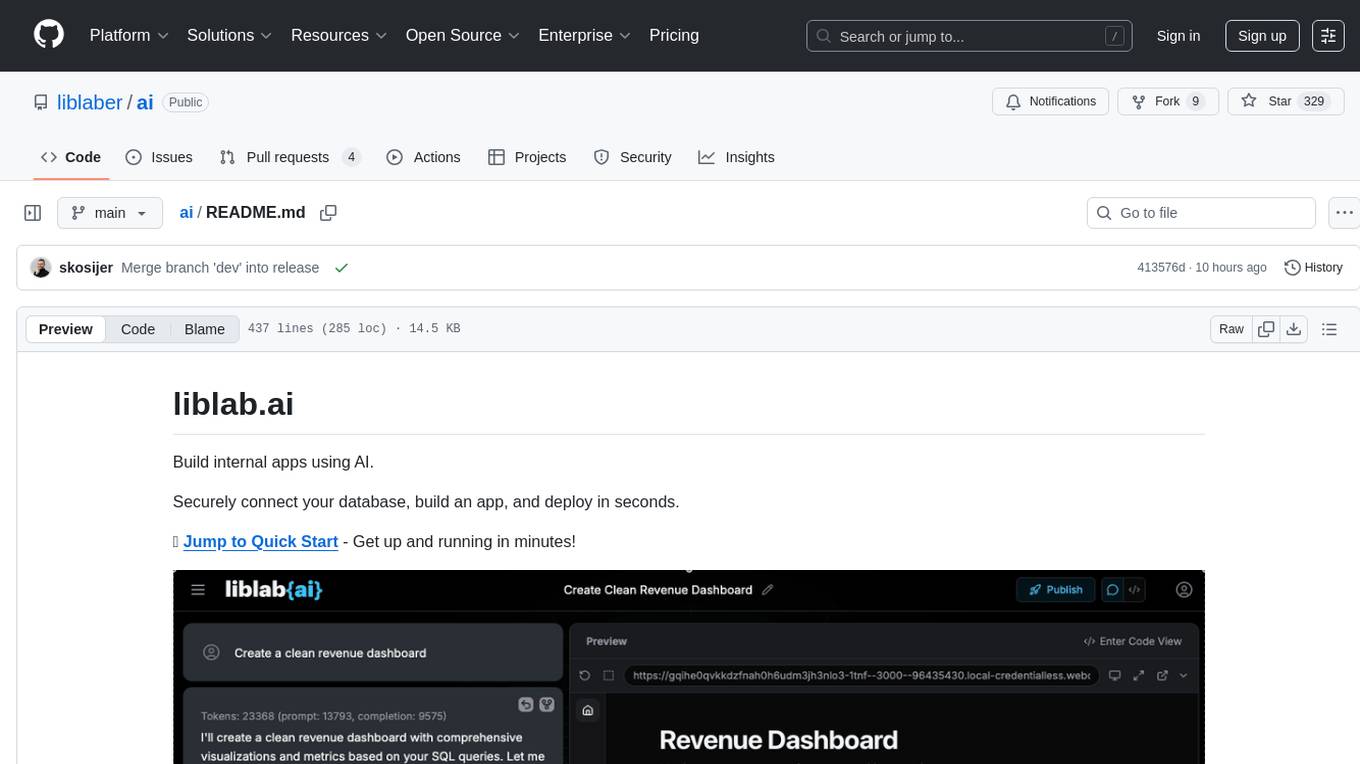
ai
This repository contains a collection of AI algorithms and models for various machine learning tasks. It provides implementations of popular algorithms such as neural networks, decision trees, and support vector machines. The code is well-documented and easy to understand, making it suitable for both beginners and experienced developers. The repository also includes example datasets and tutorials to help users get started with building and training AI models. Whether you are a student learning about AI or a professional working on machine learning projects, this repository can be a valuable resource for your development journey.
For similar tasks

AI-Agents-for-Medical-Diagnostics
AI Agents for Medical Diagnostics is a repository containing a collection of machine learning models and algorithms designed to assist in medical diagnosis. The tools provided in this repository are specifically tailored for analyzing medical data and making predictions related to various health conditions. By leveraging the power of artificial intelligence, these agents aim to improve the accuracy and efficiency of diagnostic processes in the medical field. Researchers, healthcare professionals, and data scientists can benefit from the resources available in this repository to develop innovative solutions for diagnosing illnesses and predicting patient outcomes.

qdrant
Qdrant is a vector similarity search engine and vector database. It is written in Rust, which makes it fast and reliable even under high load. Qdrant can be used for a variety of applications, including: * Semantic search * Image search * Product recommendations * Chatbots * Anomaly detection Qdrant offers a variety of features, including: * Payload storage and filtering * Hybrid search with sparse vectors * Vector quantization and on-disk storage * Distributed deployment * Highlighted features such as query planning, payload indexes, SIMD hardware acceleration, async I/O, and write-ahead logging Qdrant is available as a fully managed cloud service or as an open-source software that can be deployed on-premises.
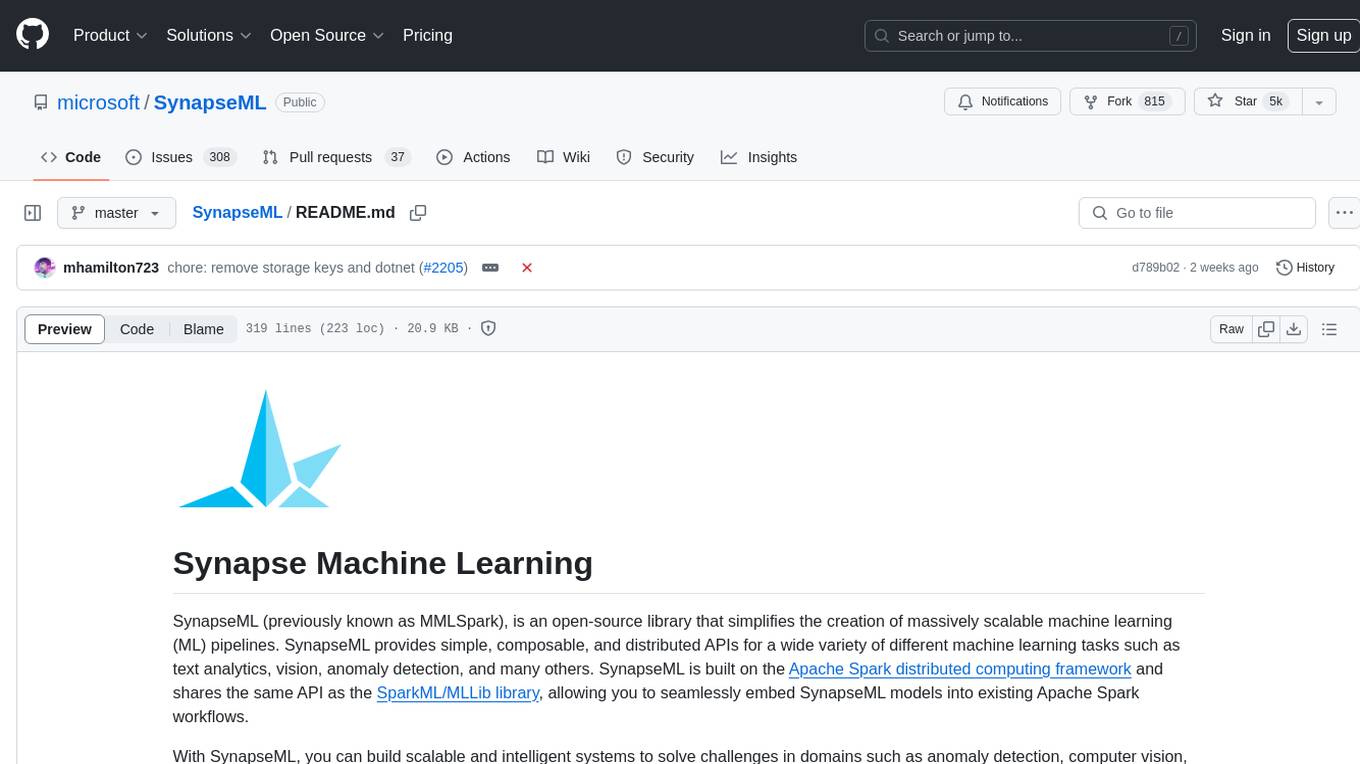
SynapseML
SynapseML (previously known as MMLSpark) is an open-source library that simplifies the creation of massively scalable machine learning (ML) pipelines. It provides simple, composable, and distributed APIs for various machine learning tasks such as text analytics, vision, anomaly detection, and more. Built on Apache Spark, SynapseML allows seamless integration of models into existing workflows. It supports training and evaluation on single-node, multi-node, and resizable clusters, enabling scalability without resource wastage. Compatible with Python, R, Scala, Java, and .NET, SynapseML abstracts over different data sources for easy experimentation. Requires Scala 2.12, Spark 3.4+, and Python 3.8+.
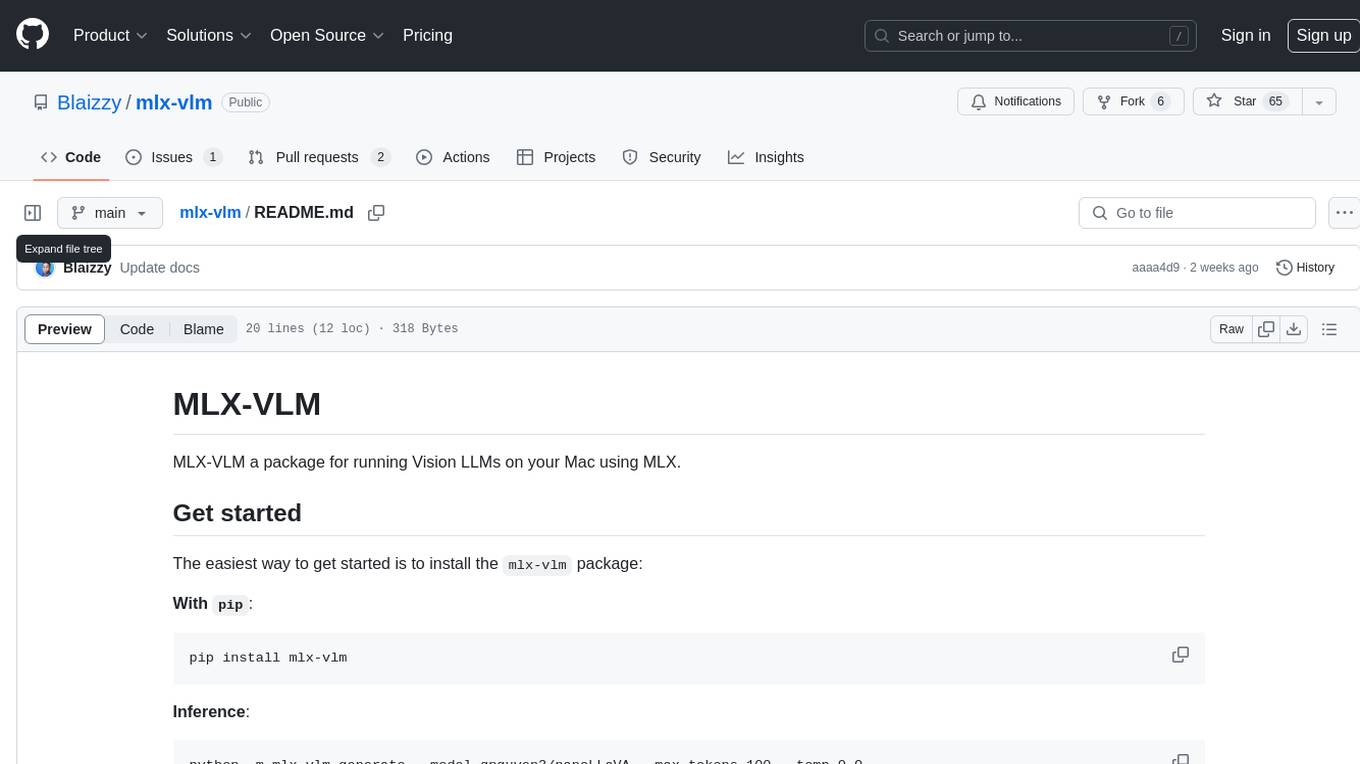
mlx-vlm
MLX-VLM is a package designed for running Vision LLMs on Mac systems using MLX. It provides a convenient way to install and utilize the package for processing large language models related to vision tasks. The tool simplifies the process of running LLMs on Mac computers, offering a seamless experience for users interested in leveraging MLX for vision-related projects.
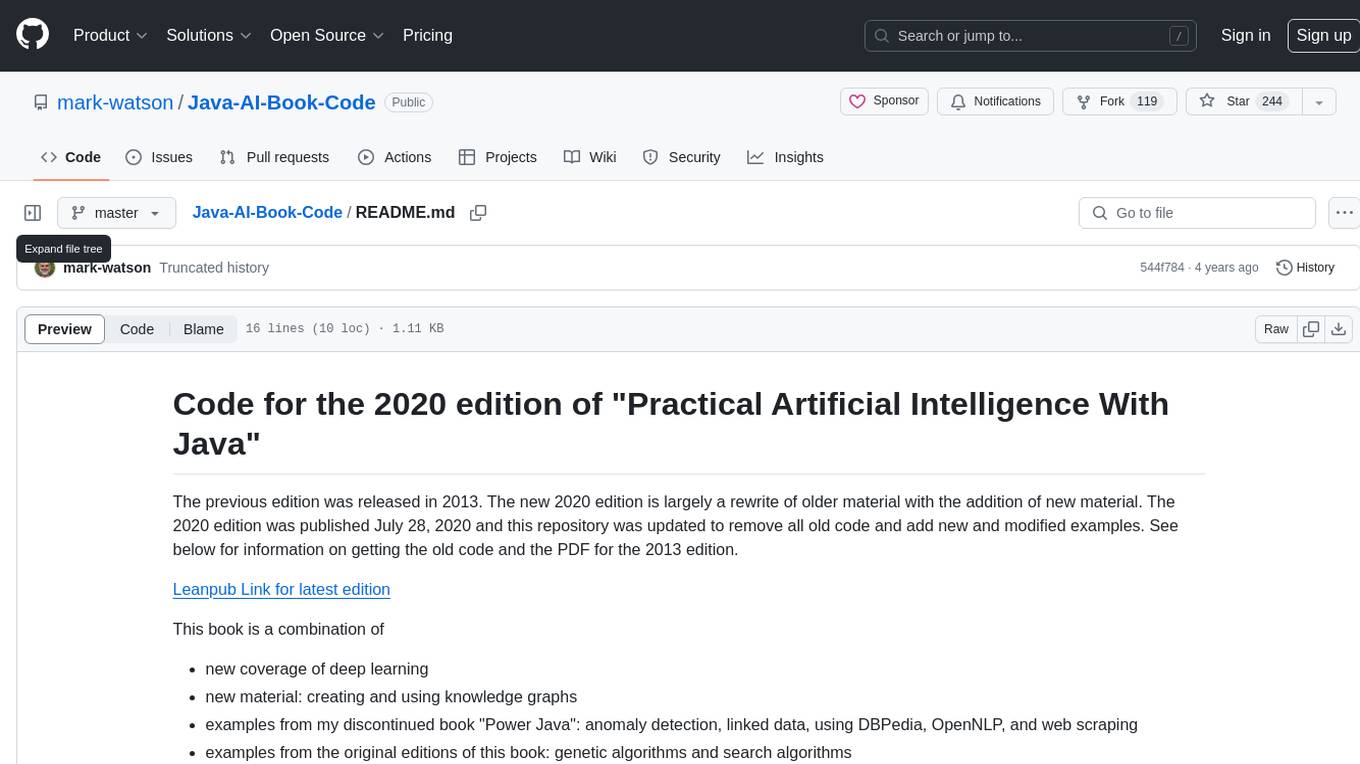
Java-AI-Book-Code
The Java-AI-Book-Code repository contains code examples for the 2020 edition of 'Practical Artificial Intelligence With Java'. It is a comprehensive update of the previous 2013 edition, featuring new content on deep learning, knowledge graphs, anomaly detection, linked data, genetic algorithms, search algorithms, and more. The repository serves as a valuable resource for Java developers interested in AI applications and provides practical implementations of various AI techniques and algorithms.
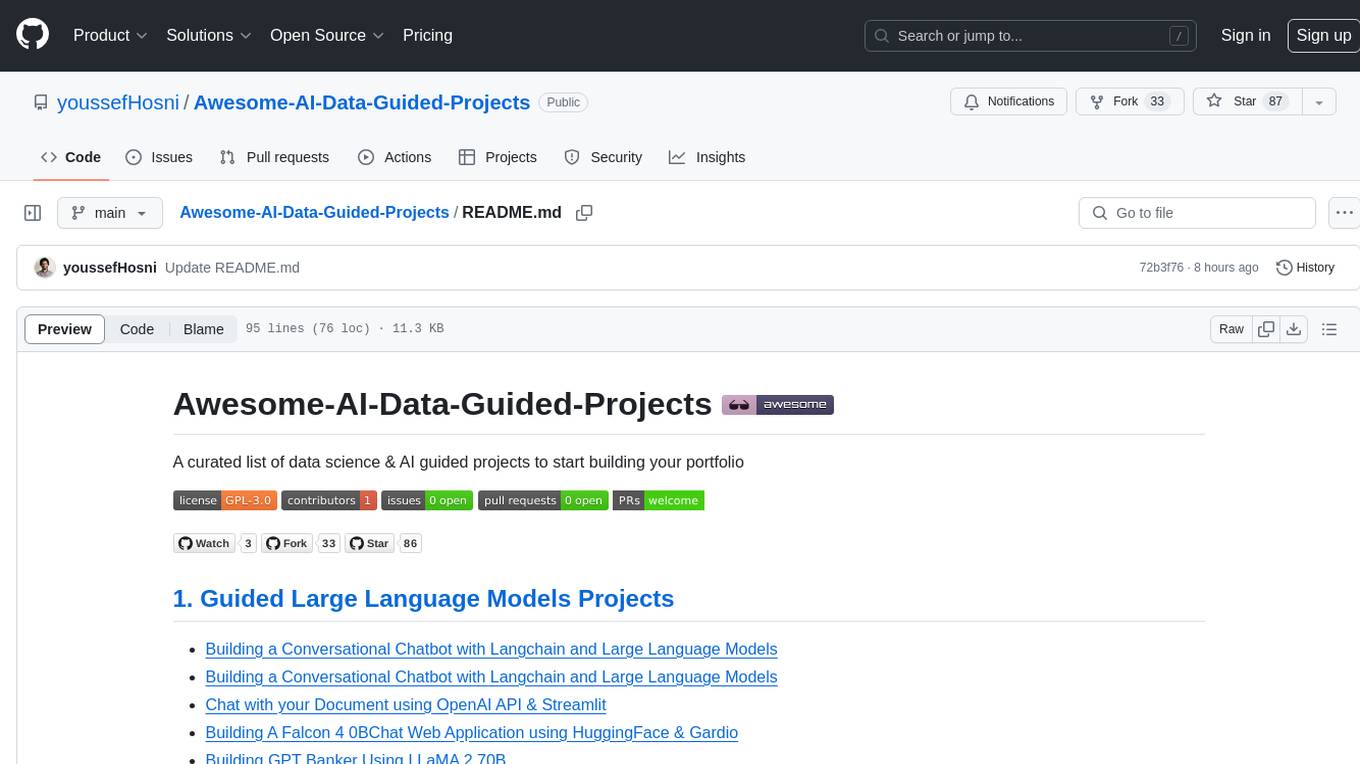
Awesome-AI-Data-Guided-Projects
A curated list of data science & AI guided projects to start building your portfolio. The repository contains guided projects covering various topics such as large language models, time series analysis, computer vision, natural language processing (NLP), and data science. Each project provides detailed instructions on how to implement specific tasks using different tools and technologies.
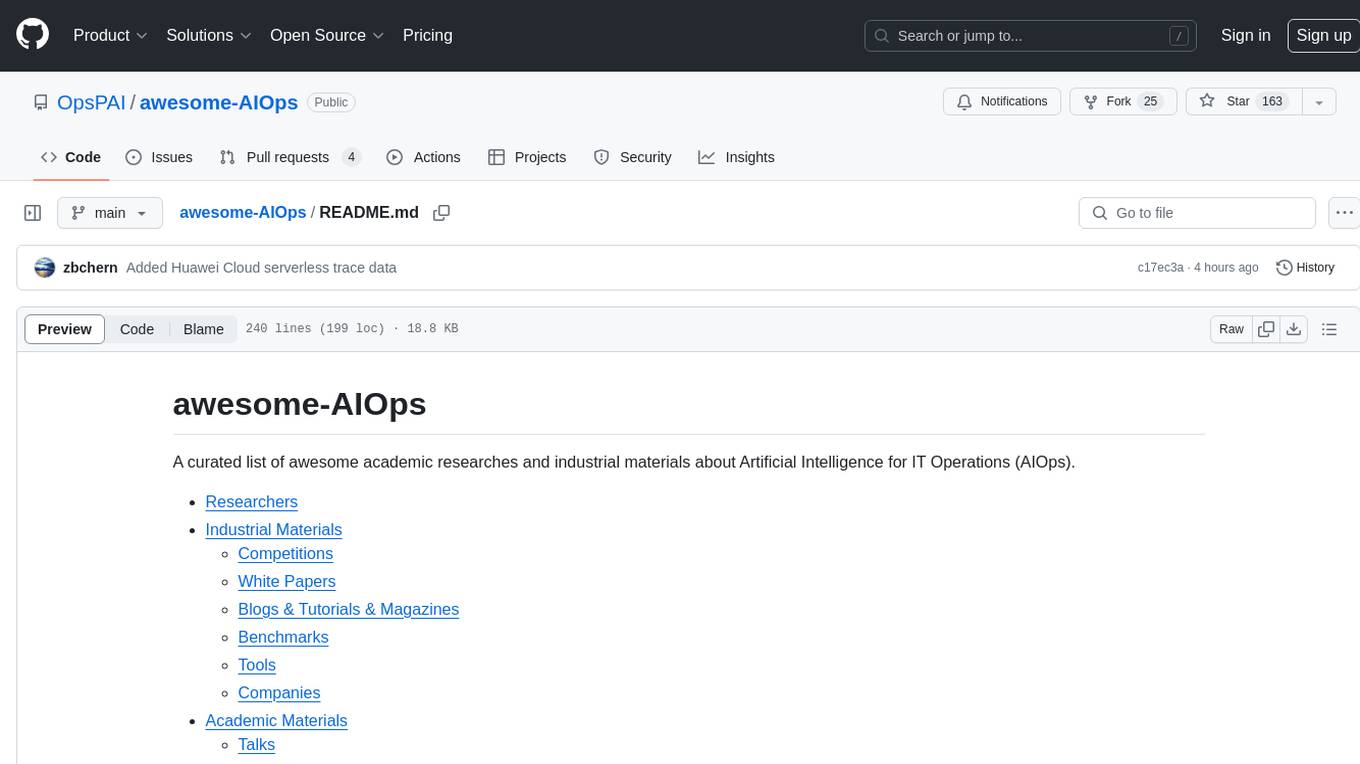
awesome-AIOps
awesome-AIOps is a curated list of academic researches and industrial materials related to Artificial Intelligence for IT Operations (AIOps). It includes resources such as competitions, white papers, blogs, tutorials, benchmarks, tools, companies, academic materials, talks, workshops, papers, and courses covering various aspects of AIOps like anomaly detection, root cause analysis, incident management, microservices, dependency tracing, and more.
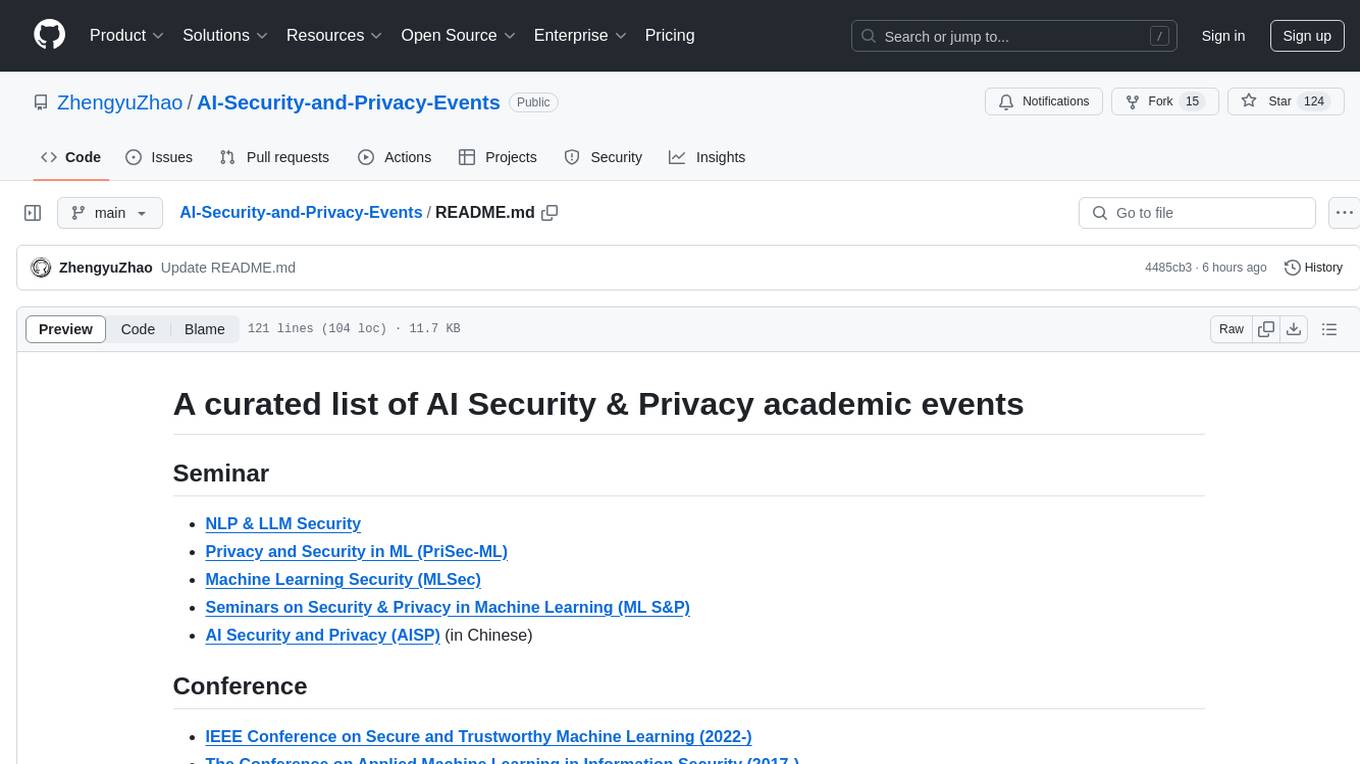
AI-Security-and-Privacy-Events
AI-Security-and-Privacy-Events is a curated list of academic events focusing on AI security and privacy. It includes seminars, conferences, workshops, tutorials, special sessions, and covers various topics such as NLP & LLM Security, Privacy and Security in ML, Machine Learning Security, AI System with Confidential Computing, Adversarial Machine Learning, and more.
For similar jobs
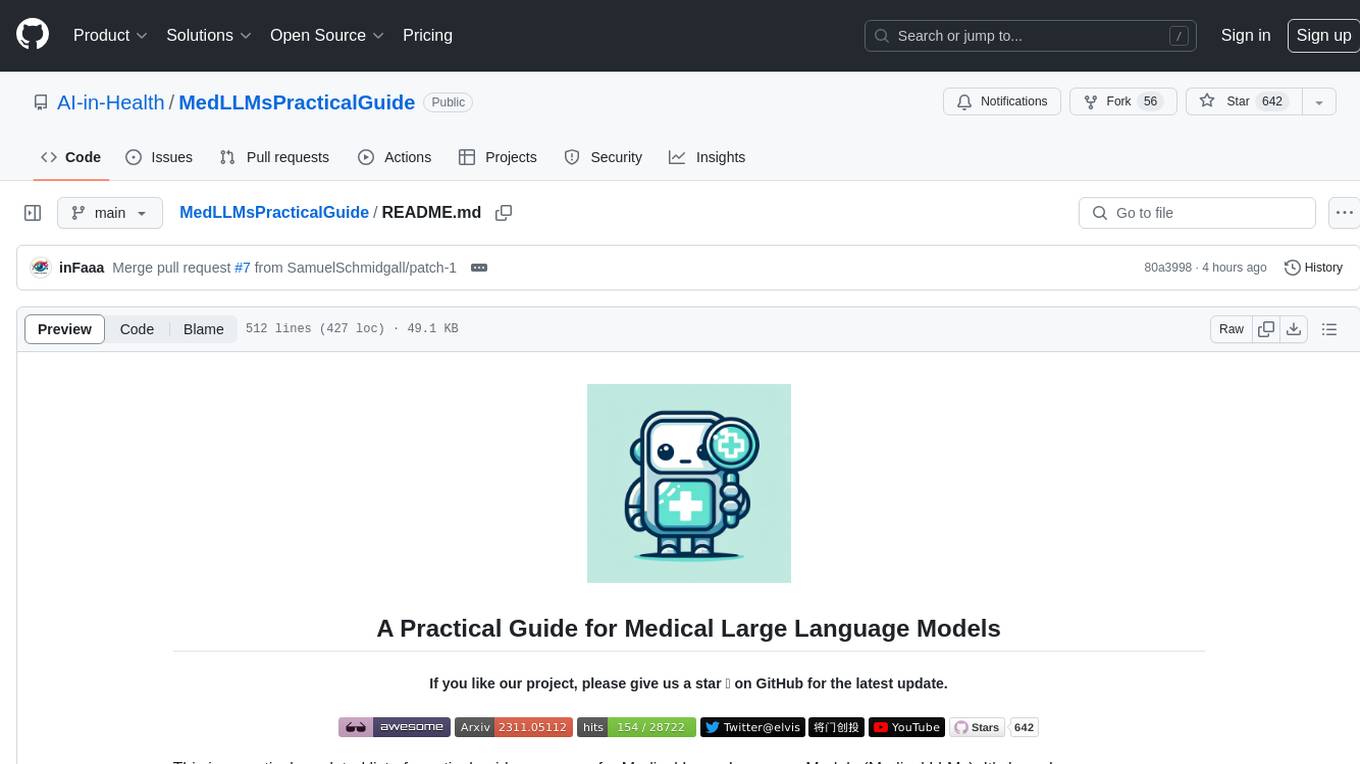
MedLLMsPracticalGuide
This repository serves as a practical guide for Medical Large Language Models (Medical LLMs) and provides resources, surveys, and tools for building, fine-tuning, and utilizing LLMs in the medical domain. It covers a wide range of topics including pre-training, fine-tuning, downstream biomedical tasks, clinical applications, challenges, future directions, and more. The repository aims to provide insights into the opportunities and challenges of LLMs in medicine and serve as a practical resource for constructing effective medical LLMs.
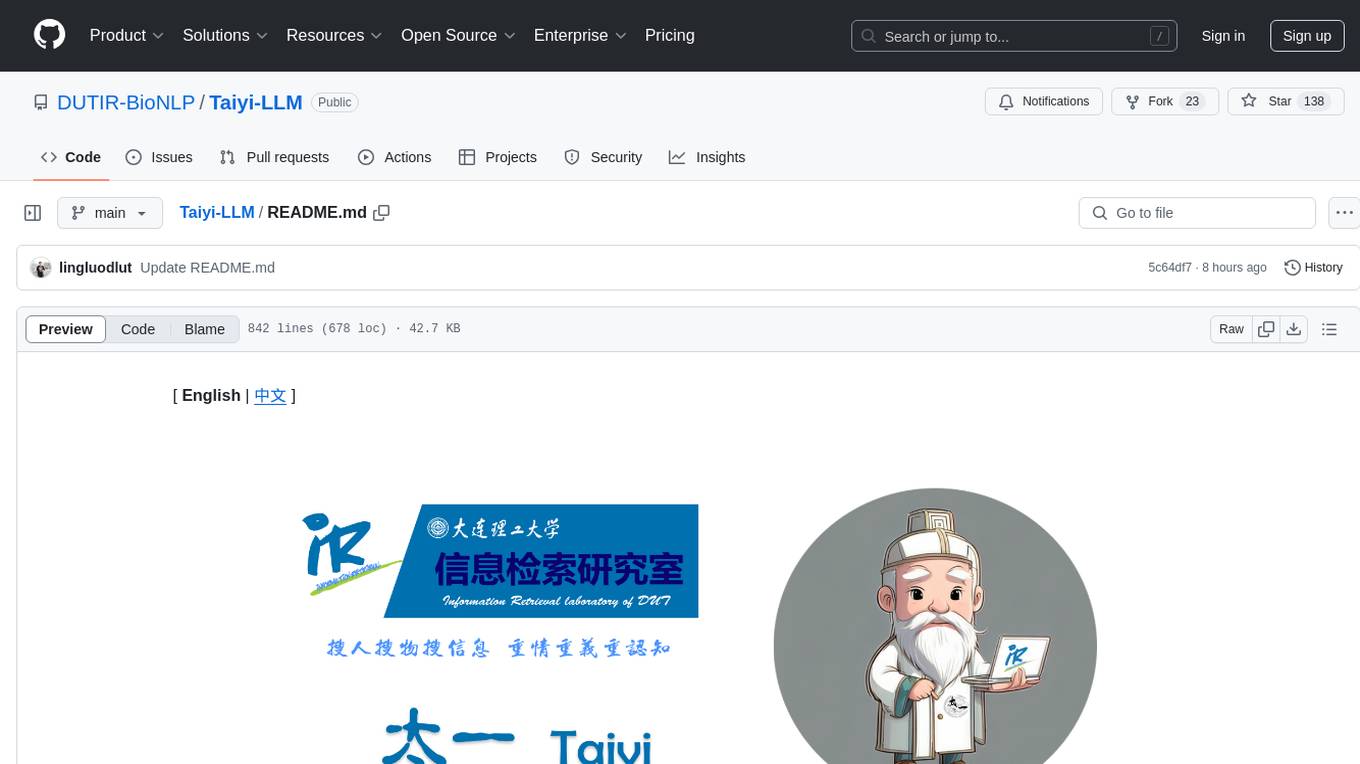
Taiyi-LLM
Taiyi (太一) is a bilingual large language model fine-tuned for diverse biomedical tasks. It aims to facilitate communication between healthcare professionals and patients, provide medical information, and assist in diagnosis, biomedical knowledge discovery, drug development, and personalized healthcare solutions. The model is based on the Qwen-7B-base model and has been fine-tuned using rich bilingual instruction data. It covers tasks such as question answering, biomedical dialogue, medical report generation, biomedical information extraction, machine translation, title generation, text classification, and text semantic similarity. The project also provides standardized data formats, model training details, model inference guidelines, and overall performance metrics across various BioNLP tasks.

AI-Agents-for-Medical-Diagnostics
AI Agents for Medical Diagnostics is a repository containing a collection of machine learning models and algorithms designed to assist in medical diagnosis. The tools provided in this repository are specifically tailored for analyzing medical data and making predictions related to various health conditions. By leveraging the power of artificial intelligence, these agents aim to improve the accuracy and efficiency of diagnostic processes in the medical field. Researchers, healthcare professionals, and data scientists can benefit from the resources available in this repository to develop innovative solutions for diagnosing illnesses and predicting patient outcomes.

weave
Weave is a toolkit for developing Generative AI applications, built by Weights & Biases. With Weave, you can log and debug language model inputs, outputs, and traces; build rigorous, apples-to-apples evaluations for language model use cases; and organize all the information generated across the LLM workflow, from experimentation to evaluations to production. Weave aims to bring rigor, best-practices, and composability to the inherently experimental process of developing Generative AI software, without introducing cognitive overhead.

agentcloud
AgentCloud is an open-source platform that enables companies to build and deploy private LLM chat apps, empowering teams to securely interact with their data. It comprises three main components: Agent Backend, Webapp, and Vector Proxy. To run this project locally, clone the repository, install Docker, and start the services. The project is licensed under the GNU Affero General Public License, version 3 only. Contributions and feedback are welcome from the community.

oss-fuzz-gen
This framework generates fuzz targets for real-world `C`/`C++` projects with various Large Language Models (LLM) and benchmarks them via the `OSS-Fuzz` platform. It manages to successfully leverage LLMs to generate valid fuzz targets (which generate non-zero coverage increase) for 160 C/C++ projects. The maximum line coverage increase is 29% from the existing human-written targets.

LLMStack
LLMStack is a no-code platform for building generative AI agents, workflows, and chatbots. It allows users to connect their own data, internal tools, and GPT-powered models without any coding experience. LLMStack can be deployed to the cloud or on-premise and can be accessed via HTTP API or triggered from Slack or Discord.

VisionCraft
The VisionCraft API is a free API for using over 100 different AI models. From images to sound.